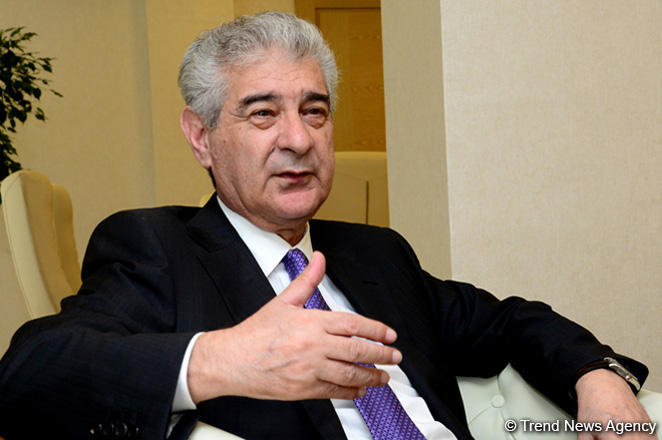BAKU, Azerbaijan, July 14
By Elchin Mehdiyev - Trend:
Nikol Pashinyan's government carried out a provocation on Armenian-Azerbaijani border to protect its dictatorial regime from the growing anger of the Armenian people, Azerbaijani Deputy Prime Minister, Deputy Executive Secretary of the ruling New Azerbaijan Party Ali Ahmadov said in an interview to the local REAL TV channel, Trend reports.
He pointed out that Azerbaijan's army gave a worthy response to the Armenian armed forces.
“Our soldiers inflicted devastating strikes on the Armenian army. I think that the Armenians at least regretted attempting this provocation, as our martyrs were revenged,” Ahmadov noted.
The deputy prime minister pointed out that Armenia cannot reconcile with the strengthening of Azerbaijan’s position in the international arena, the growth of Azerbaijan's prestige, its direct participation in the implementation of various international projects.
According to him, the decision to convene a special session of the UN General Assembly on the initiative of President Ilham Aliyev also shows importance of Azerbaijan for the international community.
“However, Armenia is trying to weaken the position of our country in the world community by making provocations on the border and blaming Azerbaijan for this, although it is a lie,” he said.
He reminded that President Ilham Aliyev also touched upon Armenia's provocation during the online meeting of the Security Council.
"This is a message to the international community, including the OSCE Minsk Group, that Azerbaijan will never allow the creation of a second Armenian state on its territory, using all means to free its lands,” Ali Ahmadov said. “The Azerbaijani society and government repeatedly expressed concern over the OSCE Minsk Group’s activity. The fact that the conflict is still unresolved is clear evidence of the group’s inability to adequately fulfill its responsibilities.”
“Despite the military aggression, the occupation of part of our lands and the fact that a million people became internally displaced persons, the Minsk Group did not name the aggressor by its name. In the case of aggression, it’s impossible to eliminate it without identifying the perpetrator. Therefore, the OSCE Minsk Group should clearly state its position," Ahmadov added.
Starting from noon on July 12, units of the armed forces of Armenia, grossly violating the ceasefire in the direction of Azerbaijan’s Tovuz district along the Azerbaijani-Armenian state border, opened artillery fire at Azerbaijani positions.
Azerbaijan's armed response forced the Armenian army to retreat suffering losses.
Azerbaijan's sergeant of military service Vugar Sadigov and corporal Elshad Mammadov, died while repelling the attack of the Armenian armed forces. Another serviceman, Khayyam Dashdemirov died from severe wounds despite the doctors' efforts.
The tensions in Tovuz district on the Azerbaijan-Armenia state border continued July 12 night. During the night battles, by using artillery, mortars and tanks, the Azerbaijani armed forces destroyed a stronghold, bombshells, vehicles and servicemen on the territory of the Armenia’s military unit. Senior lieutenant of Azerbaijani army Rashad Mahmudov was killed during the battles.
The conflict between the two South Caucasus countries began in 1988 when Armenia made territorial claims against Azerbaijan. As a result of the ensuing war, Armenian armed forces occupied 20 percent of Azerbaijan, including the Nagorno-Karabakh region and seven surrounding districts.
The 1994 ceasefire agreement was followed by peace negotiations. Armenia has not yet implemented four UN Security Council resolutions on the withdrawal of its armed forces from Nagorno Karabakh and the surrounding districts.






